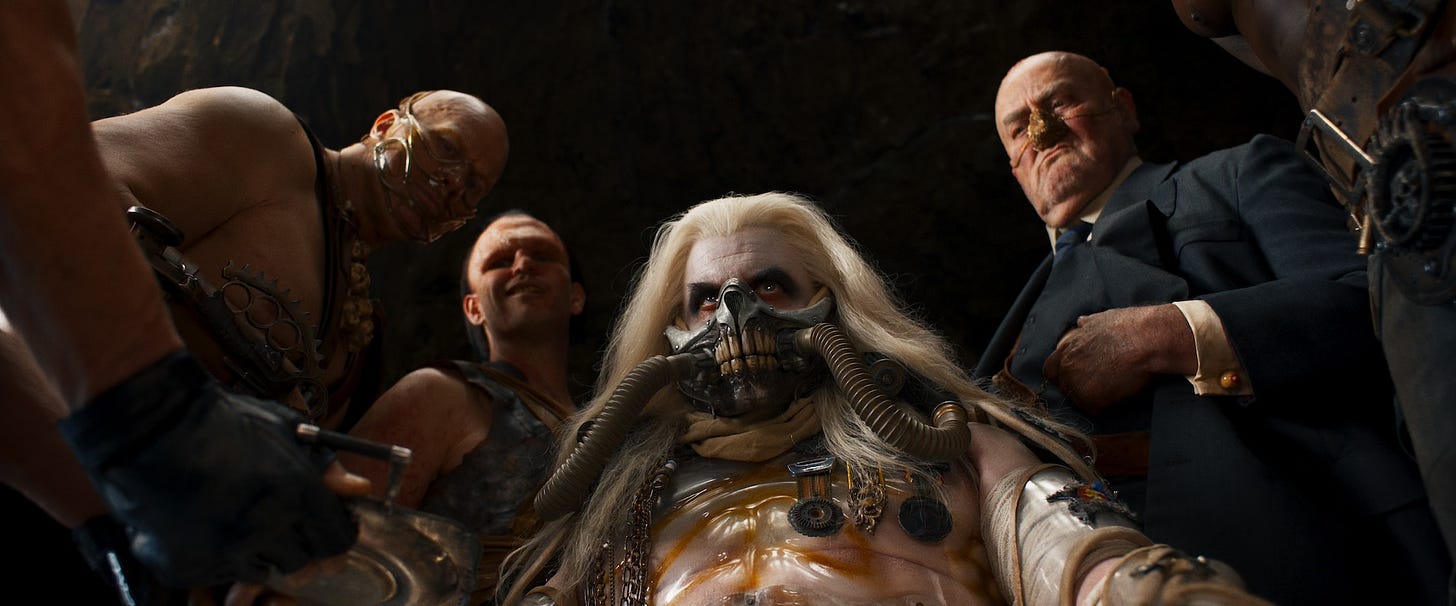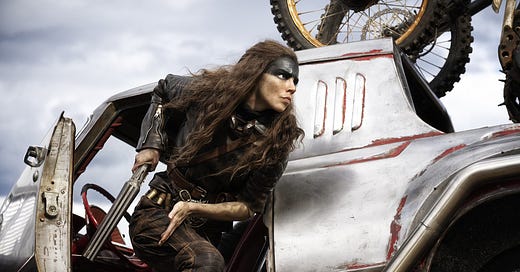
[Spoilers ahead for Furiosa: A Mad Max Saga]
For most of Furiosa: A Mad Max Saga, the star of the film doesn’t seem to be Furiosa (Anya Taylor-Joy). Instead, she’s more of a passenger similar to Max in previous Mad Max movies where her arc exists in the shadow of the larger conflict she’s encountered. Furthermore, while both Furiosa and Max have clear character arcs in Mad Max: Fury Road, you could almost make the case that the Furiosa we meet as a child (played by Alyla Browne) is the same as an adult—brave, determined, intelligent, and uncompromising. This isn’t the story of a girl who became hardened by the trauma she encountered, and director George Miller doesn’t seem particularly interested in telling a story of radical transformation. Instead, the larger question surrounding Furiosa (and also Fury Road) is if the world is hell, is it worth pursuing anything more than selfish survival?
In Fury Road, Furiosa (Charlize Theron) is looking for redemption, and we’re left to assume she had to do some awful things to become a trusted Imperator for the tyrannical Immortan Joe (Hugh Keays-Byrne). Max (Tom Hardy) rediscovers his heroism as his journey with Furiosa pushes him to grow beyond his single instinct of “survival.” Fury Road is a movie about rebirth, so it makes sense that its prequel, Furiosa, is about death.
Through that lens, the question becomes how characters deal with the grief from all the death that surrounds them, which becomes crystallized in the final scene between Furiosa and her kidnapper, Dementus (Chris Hemsworth). In this climactic scene, we see that Miller isn’t seeking to celebrate Furiosa’s actions, but question if there’s anything more to her than simply being tough, and what would have led her to rescue Immortan Joe’s wives in the first place. Being a survivor in the wasteland is a given (and if the film has a major flaw, it’s that despite the incredible set pieces, there’s little dramatic weight since it’s a prequel; we’re waiting to see how Furiosa is gonna lose that arm); what would qualify as “heroic” is the larger question.
Miller puts this in contrast to Dementus, and in his final confrontation with Furiosa, he comes clean about what he is—a sadist looking to escape the overwhelming grief he feels. He tries to sell Furiosa the line that they’re the same; they inflict violence because they’re desperate to feel anything, and they need to cause increasing amounts of pain to feed their addiction. Dementus, who lost his children and now wears a stuffed animal as a totem to that loss, only has his grief, which he feels entitles him to conquer and kill. Is Furiosa’s cry that she wants her lost mother and homeland back any more reasonable than Dementus’ desire to rule the wasteland? In the wasteland where life is cheap and killing is necessary, does Furiosa killing Dementus carry any weight?
To unpack this, we need to look at the depths of male futility and why Furiosa transcends this narrow, feeble existence.
Nipples

In my Letterboxd review, I joked that Furiosa had more nipple stuff than I expected. But here’s the thing—the nipple stuff has a thematic purpose. Nipples on guys are useless. They’re a leftover of embryonic development since all human embryos start as female before biological sex is determined around six or seven weeks of pregnancy. The nipple for women serves the biological purpose of nourishing the young; for men, they’re just kind of there, and in the world of Max Max where so many things are dead or dying, men only see these biological vestigates as instruments of masochistic pain.
Furiosa gives us more time with The People Eater (John Howard), one of Immortan Joe’s lieutenants who has a perversion in posh dress as his three-piece suit has cut-outs for his nipples, which are pierced and chained like they’re a pocket watch. He’s constantly massaging or grasping at his nipples, which is not really what you want to see from a guy named “The People Eater” but it also emphasizes a constant masochism on his part as if he has an ongoing desire to feel pain.
An early scene with The People Eater gives a standoff with Dementus, who threatens to blow up Gastown (the source of all fuel for the wasteland; the name is not misleading and neither is “The Bullet Farm”) if he’s not made its overlord. To ensure his survival, Dementus has rigged a Dead Man’s Switch, so if Immortan Joe and his cadre try to kill him, everyone in the room will be killed. And what is the device hooked up to? Dementus’ nipples. The electrodes are eventually ripped off along with the nipples, further emphasizing that for men, this raised bit of tissue only exists as a way to feel pain.
Everything tender or soft in the Wasteland, for men, must give way to pain because pain is their only vehicle for pleasure, and it doesn’t matter where that pain gets inflicted as long as it exists. There’s no room for positive expression of feeling because the Wasteland, ruled by men, dictates that all emotion flows through a violent filter. What separates Furiosa’s survival from that of Dementus and his peers is that she doesn’t relish sadism. The question then becomes, “If Furiosa relishes taking her revenge on Dementus, doesn’t that simply identify her with her abuser, thus continuing the cycle of retribution?” What hangs over Furiosa isn’t her ability to survive in the Wasteland; it’s what kind of person will she become when separated from her tribe, the Vuvalini.
“Beyond Vengeance”
This tension exists in how Furiosa works to both shed, hide, and assume her identity. While her actions are always geared towards survival (and the film never relents on showing her as anything other than a competent badass), there’s the question of how time passes showing Furiosa growing further from her tribe. The Vuvalini don’t cut their hair, but Furiosa has to so she can escape life as one of Immortan Joe’s “wives.” She then spends years masquerading as a mute boy mechanic. She regrows her hair when working alongside Praetorian Jack (Tom Burke), but there’s the implication that her feminity is only allowed to exist within the violent framework of her profession; to put it another way, she has her job because Jack signs off on it rather than Immortan Joe developing any feminist realization that a woman can drive a war rig. Furiosa shaving her head again after Jack’s death and the loss of her arm feels like a step back to the world of the masculine so she can go to war and kill Dementus. She now looks like the Furiosa we know from Fury Road, but one missing the crucial element that would push her to save the captured wives.
One thing we have to reconcile in Furiosa’s character is her earlier unwillingness to help the wives. She knows of their existence and torment from a young age since she was slated to be one of them. However, instead of working to free them, she remains focused on either killing Dementus or trying to get back to her homeland. In her final confrontation with Dementus, both of her dreams are now at hand. She can kill Dementus and simply leave. She knows the way back home (although her losing the arm tattooed with the map foreshadows how a map for only one person is something she literally and figuratively has to leave behind). Why not kill Dementus in the desert, take her car, and drive back to The Green Place?
This is where Furiosa shows us the real confrontation isn’t with Dementus but with Furiosa’s desires. She has Dementus dead to rights, and yet killing him doesn’t bring her back anything. It doesn’t do anything for anyone else. It makes her as childish as Dementus, a man who claims a deep well of grief, but whose totemic teddy bear speaks more of infantilization than any recognition of loss beyond his own. Furiosa punching Dementus in the face and demanding her life back is just as immature since everyone in the Wasteland has experienced loss and hardship. When Dementus asks her, “Do you have it in you to make it epic?” it’s more of a taunt as he thinks there’s no kind of violence she can inflict that will give her separation from her tormentor.
That’s where we get to what’s ingenious about Furiosa’s revenge, and how it comes back to the gendered grief of the movie. Rather than simply kill or torture Dementus, she settles on something unique. She instead decides to take him back to the Citadel and plant the seed from her homeland on top of him. Dementus loses his voice (an empty nattering that served nothing beyond his vanity) and becomes both prisoner and nourisher to the tree. Furthermore, the tree grows out of his genital region, thus serving as a kind of mockery where he symbolically has a manhood the size of a tree, but he is crushed beneath it.
The tree won’t let him die, and his body feeds the tree, so he lives the long, isolated life he deserves while also being forced into creating life rather than destroying it. Furiosa then takes fruit from the tree and serves it to the captured wives. What makes Furiosa heroic isn’t that she gets vengeance on Dementus, but that rather than give into the impulse for destruction, she finds a way to creation and freedom for her fellow captive women. Her story becomes one of transcendence rather than simple retribution.










